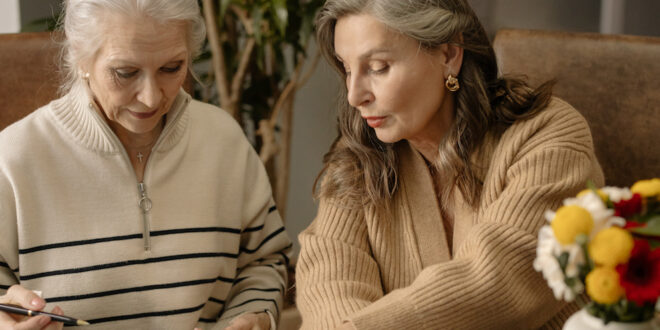Plenty is written about dementia – what this cruel disease is, and how it plays out. Far less is written about what to do when you suspect a friend may have dementia, which is exactly the situation I found myself in, two years ago.
Margaret (not her real name) and I have been friends for 35 years. We don’t live in the same town; we’ve never been good at phoning each other, but we did send emails and birthday cards, and even the occasional letter. Whenever we met up (usually 4 or 5 times a year), it was as though we’d never been apart.
But one afternoon (I remember it so clearly), I called on Margaret when I was driving through her town – and she said something that confused and alarmed me. She told me she had recently been to visit her son, James, in Germany (which was true – she had), but when she’d arrived at Frankfurt airport, she couldn’t understand why all the signs were in German. She said: ‘It felt like a dream.’ She also told me her son was cross with her because, instead of waiting at the arrival lounge for him as they had planned, she had taken a taxi to his apartment. She said he had become very worried when he couldn’t locate his mother at the airport.
Because Margaret had recently lost her husband, I put her experience at the airport down to stress and grief, coupled with jet lag, and told her so. She seemed relieved to hear me say this.
However, a few months later, when I was with Margaret again, she confessed she was having trouble ‘finding herself’. When I probed, gently, to see if it was grief-related, she said she supposed it was, but it was ‘the strangest feeling, because it’s as though I don’t know who I am, any more’. By now, I had my suspicion all wasn’t well with Margaret, but I wasn’t sure what to do, especially as her only child lived abroad.
However, the next time I met Margaret, several months later, I felt I had to act. She told me she had gone by bus to visit Helen (a mutual friend of ours), intending to stay several days. But, when she arrived, Helen had been very rude to her, so she had gone home again without even staying the night.
This sounded so out of character for Helen as to be unbelievable, but at least I now had someone whom I could confer with. I immediately phoned Helen, who assured me not only was Margaret’s interpretation of their meeting completely confused, but she (Helen) had, like me, been worried about Margaret’s behaviour for several months.
Finally, we were able to corroborate our suspicions, and make a plan. Between us, we managed to recall the names of Margaret’s siblings, and then managed to find contacts for them – and lo and behold, they were also having concerns about their sister.
The rest is history. With the help of family, Margaret (who has since been diagnosed with dementia), now lives in a retirement village in the same town as her siblings, where they can offer her care and support. Her son has been alerted to his mother’s diagnosis, and is making more regular trips back to see his mother, and Margaret is under the care of an experienced geriatrician.
I would like to say it’s a happy ending, but of course, in cases of dementia, it seldom is. However, I still go to visit Margaret, and with the help of Alzheimer’s NZ, I am learning new ways to engage with her. I only wish I had known more about dementia before. If I had, I might have been able to help my dear friend, sooner.









Admin - 2 years ago
Thank you for your feedback Gladys, we will be a bit more careful with our headings in the future!